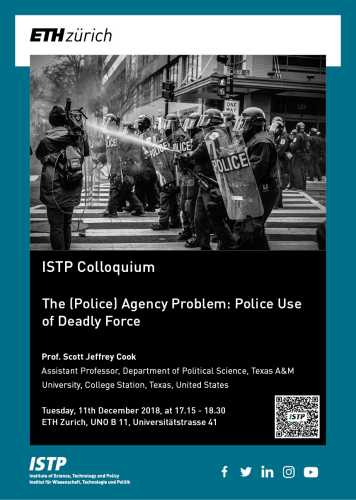Colloquium: Prof. Scott Jeffrey Cook
Tuesday, 11th December 2018, at 17.15 - 18.30
ETH Zurich, UNO B 11, Universitätstrasse 41
The (Police) Agency Problem: Police Use of Deadly Force

As recent media attention has highlighted, the application of deadly force by police officers in the United States is an ongoing problem. Yet, we do not even know the magnitude of this violence, let alone its causes. This is because official statistics on deadly force come from voluntary reports by state, county, and municipal police departments and, as such, are subject to bias. Using crowd-sourced data on police killings, we find that hundreds of police killings are obfuscated annually as a function of this reporting bias. In this article, we argue that this reporting bias can be overcome through legislative oversight and provide evidence that states endowed with high capacity legislatures, possessing the resources to scrutinize executive agencies (such as police departments), provide much more accurate statistics on police killings than states with low capacity legislatures. Two important implications arise: 1) legislative oversight is important for police transparency, 2) analyses using FBI statistics cloud our understanding on the causes of police violence (ex. median income, legislative capacity) due to systematic reporting differences across states.
Co-authored work with external page David Fortunato (Associate Professor, Texas A&M University, US)
About Prof. Scott Jeffrey Cook
Prof. Cook is an Assistant Professor in the Department of Political Science and Co-Director of the Program in Research Methods at Texas A&M University. His research and teaching focuses on quantitative methods and conflict processes. Specifically, his research addresses empirical challenges to inference in the analysis of political violence, including outcome interdependence, measurement error, and sparse data. His research has or will appear in the American Journal of Political Science, Political Analysis, Political Science Research and Methods, and Journal of Peace Research.
Before joining the faculty at Texas A&M, he received his PhD in political science at the University of Pittsburgh. His thesis "Rare Events in International Relations: Modeling Heterogeneity and Interdependence with Sparse Data," was awarded the John T. Williams Dissertation Prize for the best proposal in political methodology.